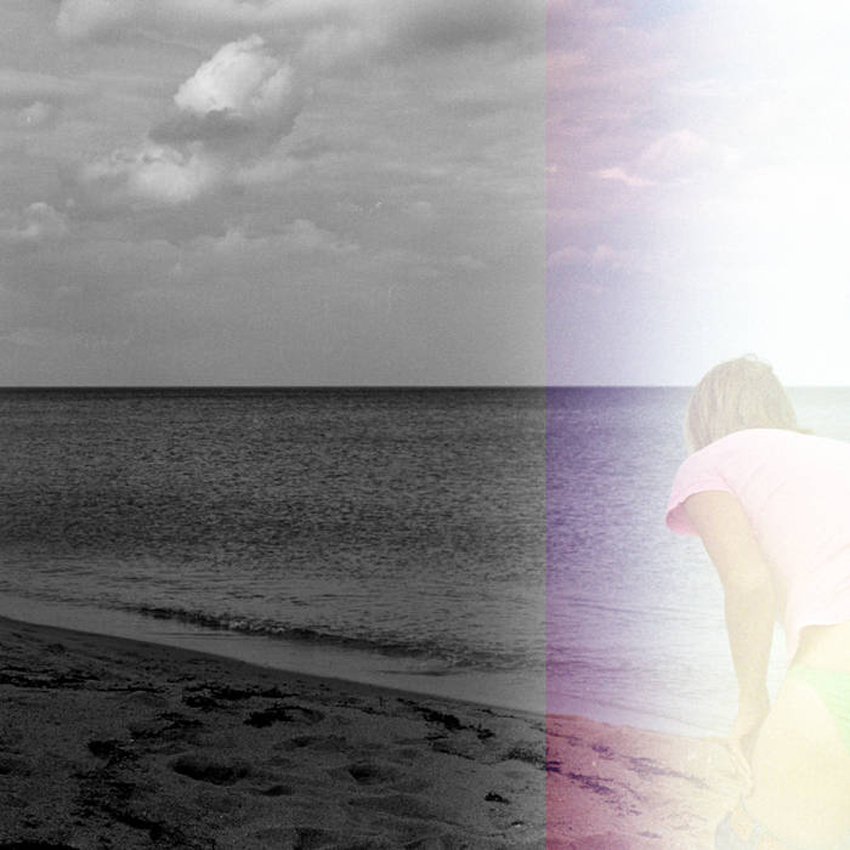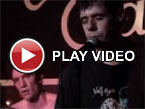Dr√∏ne, "A Perfect Blind"
 Drøne's second album was bizarrely released as a part of Record Store Day, which was quite an unexpected strategy given that few record stores are clamoring to stock new sound collage albums from Swedish record labels.  As a result, I was kind of expecting A Perfect Blind to be some sort of collectible minor release with eye-catchingly ambitious packaging and swirled gold-flecked vinyl or something.  Instead, it is just another excellent album, though Mark van Hoen and Mike Harding do enlist a murderers' row of talented collaborators including Philip Jeck and Anna von Hausswolff to help realize their expanded vision.  In fact, this album marks quite an impressive and unexpected evolution from the duo’s 2016 debut, using Reversing Into Future's beguiling miasma of shortwave radio transmissions, cryptic snatches of dialog, and droning synths as a foundation for something a bit more substantial and melodic.
Drøne's second album was bizarrely released as a part of Record Store Day, which was quite an unexpected strategy given that few record stores are clamoring to stock new sound collage albums from Swedish record labels.  As a result, I was kind of expecting A Perfect Blind to be some sort of collectible minor release with eye-catchingly ambitious packaging and swirled gold-flecked vinyl or something.  Instead, it is just another excellent album, though Mark van Hoen and Mike Harding do enlist a murderers' row of talented collaborators including Philip Jeck and Anna von Hausswolff to help realize their expanded vision.  In fact, this album marks quite an impressive and unexpected evolution from the duo’s 2016 debut, using Reversing Into Future's beguiling miasma of shortwave radio transmissions, cryptic snatches of dialog, and droning synths as a foundation for something a bit more substantial and melodic.
The first half of the opening "Back to Station" deceptively feels like a perfectly linear continuation of Drøne’s Reversing Into The Future aesthetic, as a looping synth drone coheres into an insistent pulse that quickly swells with dense layers of field recordings.  The field recordings sound a hell of a lot like a wave machine at a water theme park, as the insistent sloshing locks into the same pulse as Van Hoen's synth.  That touch lends the piece quite a visceral heft, as if the ocean itself wanted a hand in this project.  The duo soon build upon that heavy momentum with a hollow and whooshing onslaught of electronics and unrecognizable field recordings, though a recurring annoying buzz keeps things enticing strange: there is never any real hint as to which of the various divergent threads may ultimately take control of the piece.  As it turns out, none of them do, as the piece's rolling elemental force unexpectedly dissipates in favor of a bleary reverie of melancholy cellos and violas mingled with scraping and rattling metal strings.  At first, the interlude languorously drifts along in a subtly dissonant and impressionist haze, but it slowly and sneakily blossoms into a mournful descending melody that recalls the central theme of Arvo Pärt's "Cantus In Memory of Benjamin Britten."  Needless to say, it achieves an impressive degree of elegiac beauty, but I found myself far more fascinated with all of the buried and cryptic sounds bleeding into the periphery.  While Drøne are not likely to surpass Pärt's genius as a composer anytime soon, they unquestionably excel at surrounding their stabs at melody with a mesmerizing atmosphere of feverish unreality.
The album's second half is devoted to yet another side-long epic in the form of "Cutting the Screen."  Opening with a heavy thrum of slowly quavering synth and deep rumble, it gradually swells into a menacing swirl of blurry, uncomfortable harmonies and desolate industrial textures.  Though it sustains that dark atmosphere for a while, there are plenty of subtly executed small changes that cumulatively build towards a throbbing interlude of deep burbling undercurrents, buried voices, and tensely quivering strings.  That new motif is allowed is linger and accumulate tension for a while before it is ultimately engulfed in the slowly swelling roar of a new undercurrent.  Curiously, however, that roar acts as a reset button rather than the foundation of a new chapter, as everything abruptly falls away to leave only a floating and dreamlike stasis and the muted indecipherable chatter of a distant television.  It feels like an appropriate end to the album, but Harding and Van Hoen have one last trick up their sleeves, unexpectedly closing the piece with an atypically simple and conventionally pretty coda of lush strings and church organ.
If A Perfect Blind has a flaw, it is only that it feels like a collage of unrelated improvisation sessions artfully bleeding into one another.  In a way, that approach is also one of the duo's greatest strengths, as the trajectory of each piece follows a wonderfully unpredictable dream-logic.  The downside is that the pacing is sometimes puzzling and both pieces seem to ultimately follow a very similar trajectory: a hallucinatory flow of burbling, multilayered abstraction gives way to a final structured and melodic set piece (the proverbial rabbit being pulled out of the hat).  That transition would be a bit stronger if it were more seamless and less blunt, as the sharp focus of the structured, melodic passages somewhat undercut the duo's genius for murky obfuscation.  Unveiling a pay-off at the end of each piece is nice, I suppose, but it is not where Harding and Van Hoen truly shine.  Thankfully, they excel in quite a few other realms with this record (mood, vision, inventive sound sources, etc.).  Drøne's greatest accomplishment lies in their production talents, however, as A Perfect Blind is an immersive feast of rich textures and dynamic shifts in density.  While the duo have taken a bold step towards more ambitious composition and orchestration, this album is wonderful primarily because it successfully replicates the simmering and churning fever-dream alchemy of its predecessor.
 



